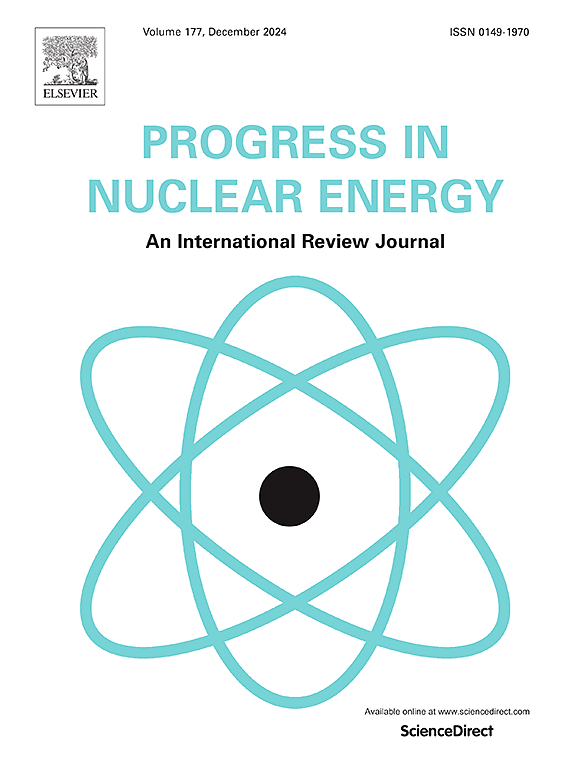采用模型预测控制的高保真微反应器负荷跟踪仿真
IF 3.2
3区 工程技术
Q1 NUCLEAR SCIENCE & TECHNOLOGY
引用次数: 0
摘要
本文介绍了一种模型预测控制(MPC)控制器在高温气冷堆(HTGR)型微堆负荷自动跟踪运行中的应用。本研究采用高保真中子码PROTEUS作为实际植物模型,提高了仿真的可靠性。简化的热液压/流体(STH)求解器和控制滚筒讨论方法已集成到PROTEUS中。此外,为了与MPC控制器集成,还开发了基于点动力学方程和集总热液压/流体(TH)模型的降阶模型。自适应MPC用于计算给定功率场景所需的控制输入,通过顺序线性化非线性降阶模型进行优化,提高精度。基于PROTEUS/MPC代码系统的数值计算结果表明,在斜坡速率为20% / min的情况下,三维微反应器的负载跟踪功率误差最小,保持在0.234%以下,控制输入保持在预定的约束范围内。对MPC控制器参数和降阶模型进行了深入的灵敏度测试,进一步验证了MPC控制器的鲁棒性和灵活性。本文章由计算机程序翻译,如有差异,请以英文原文为准。
High-fidelity microreactor load follow simulations with model predictive control
This paper presents the application of an Model Predictive Control (MPC) controller for the autonomous load-follow operation of a High-Temperature Gas-Cooled Reactor (HTGR)-type microreactor. The study enhances the reliability of the simulation by utilizing the high-fidelity neutronics code, PROTEUS, as the actual plant model. The Simplified Thermal Hydraulics/Fluids (STH) solver and control drum decusping methods have been integrated into PROTEUS. Additionally, a reduced-order model based on the point kinetics equations and lumped Thermal Hydraulics/Fluids (TH) models has been developed for integration with the MPC controller. An adaptive MPC is used to compute the control input required to follow a given power scenario, enhancing accuracy by sequentially linearizing the nonlinear reduced-order model for optimization. Numerical results from the PROTEUS/MPC code system for the load-follow operation of a 3D microreactor at a ramp rate of 20% per minute show that the tracking power error is minimal, remaining under 0.234%, and the control inputs stay within predetermined constraints. In-depth sensitivity tests on the parameters used in the MPC controller and reduced-order model further verify the robustness and flexibility of the MPC controller.
求助全文
通过发布文献求助,成功后即可免费获取论文全文。
去求助
来源期刊

Progress in Nuclear Energy
工程技术-核科学技术
CiteScore
5.30
自引率
14.80%
发文量
331
审稿时长
3.5 months
期刊介绍:
Progress in Nuclear Energy is an international review journal covering all aspects of nuclear science and engineering. In keeping with the maturity of nuclear power, articles on safety, siting and environmental problems are encouraged, as are those associated with economics and fuel management. However, basic physics and engineering will remain an important aspect of the editorial policy. Articles published are either of a review nature or present new material in more depth. They are aimed at researchers and technically-oriented managers working in the nuclear energy field.
Please note the following:
1) PNE seeks high quality research papers which are medium to long in length. Short research papers should be submitted to the journal Annals in Nuclear Energy.
2) PNE reserves the right to reject papers which are based solely on routine application of computer codes used to produce reactor designs or explain existing reactor phenomena. Such papers, although worthy, are best left as laboratory reports whereas Progress in Nuclear Energy seeks papers of originality, which are archival in nature, in the fields of mathematical and experimental nuclear technology, including fission, fusion (blanket physics, radiation damage), safety, materials aspects, economics, etc.
3) Review papers, which may occasionally be invited, are particularly sought by the journal in these fields.
 求助内容:
求助内容: 应助结果提醒方式:
应助结果提醒方式:


